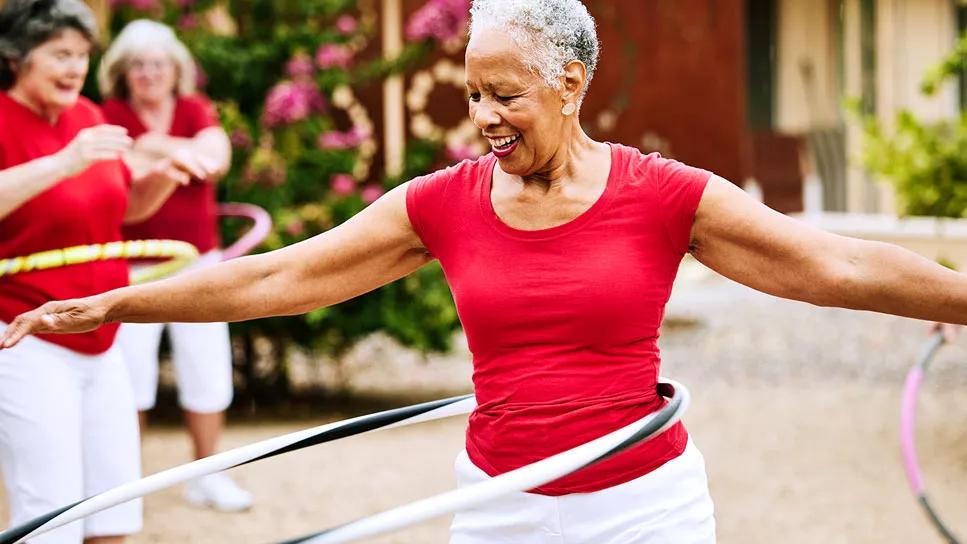It's never too early to prevent bone loss with diet, physical activity

Image content: This image is available to view online.
View image online (https://assets.clevelandclinic.org/transform/e6838285-b78d-42f7-b3b2-d99c29bb9066/elder-Exercise-Dance-1337503352-967x544-1_jpg)
Elderly woman dances and exercises with her friends
Do you think that it’s inevitable that you’ll get shorter or stooped as you get older? It’s not a foregone conclusion. In fact, a significant loss of height as you age is a sign of osteoporosis — bone a medical condition you should be aware of, especially if you’re age 50 or older.
Advertisement
Cleveland Clinic is a non-profit academic medical center. Advertising on our site helps support our mission. We do not endorse non-Cleveland Clinic products or services. Policy
The disease weakens your bones, putting them at greater risk for sudden and unexpected fractures. The disease often develops without any symptoms or pain, and usually is not discovered until the weakened bones cause painful fractures. Most of these are fractures of the hip, wrist, and spine.
Spine and hip fractures can be dangerous because they often cause chronic pain and disability. They are more likely than other broken bones to lead to long-term problems.
Up until about age 30, you normally build more bone than you lose. But after age 35, bone breakdown occurs faster than bone buildup, which causes a gradual loss of bone mass. If you have osteoporosis, you lose bone mass at a greater rate. After menopause, the rate of bone breakdown occurs even more quickly.
So while you may be more at risk to develop osteoporosis as you get older, the good news is that you can take steps to avoid it.
Losing a little height as you get older is normal. Over the years, the discs between your spine’s vertebrae flatten, your muscles start to lose mass and the spaces between your joints narrow.
However, a significant loss in height can signal osteoporosis, says rheumatologist Abby G. Abelson, MD, FACR.
Advertisement
“A lot of people are under the misconception that losing height is normal,” Dr. Abelson says. “Certainly losing a half-inch or three quarters of an inch may be normal, but I’ve seen patients who say they’ve lost two, three, or four inches in height, and they thought that was a natural consequence of aging. But it’s not.”
“We now have many safe and effective medications to prevent the fractures that are caused by osteoporosis, but it is also critical to prevent bone loss and fractures by addressing risk factors that you can control,” Dr. Abelson says.
Your diet and lifestyle are two important risk factors that you can control to prevent osteoporosis. That means eating a diet rich in calcium throughout your life and regular physical activity can help a lot. Dr. Abelson adds that it’s also important to stop smoking if you do and to avoid excessive alcohol intake.
You should aim to get 1,200 milligrams of calcium per day to help prevent bone loss, Dr. Abelson says. Exercises that make your muscles work against gravity, such as walking, jogging, aerobics, and weightlifting, are best for strengthening bones.
It’s important to spot problems early, as in some cases, suffering a fracture can be life-changing, Dr. Abelson says.
“People are more likely to die in the year after a hip fracture. People are more likely to die after a spine fracture as well,” she says. “That’s why we want to be really proactive about diagnosing this early.”
Screening for bone density typically begins around the time of menopause for women – in their mid- to late-40s, while men usually begin screening in their mid-60s. It’s a good idea to get a bone density evaluation if you’ve had any broken bones as an adult, Dr. Abelson says.
Talk to your doctor about the right time to get a bone density test
“Make sure your conversation also covers when is the right time to get treatment, as often the first symptom of a problem is a broken bone,” Dr. Abelson says.
Advertisement

Sign up for our Health Essentials emails for expert guidance on nutrition, fitness, sleep, skin care and more.
Learn more about our editorial process.
Advertisement
The short answer from a primary care specialist
Body changes put older adults at increased risk of dehydration
Some birth control can hide perimenopausal symptoms
The hump at the base of your neck may be caused by osteoporosis or poor posture
Turns out your health really is in your hands
A look at bone buildup and loss throughout your life
Learn how simple movements can preserve your health — and lessen your risk for falls
What to know to make an informed decision
Type 2 diabetes isn’t inevitable with these dietary changes
Applying a hot or cold compress can help with pain
Pump up your iron intake with foods like tuna, tofu and turkey